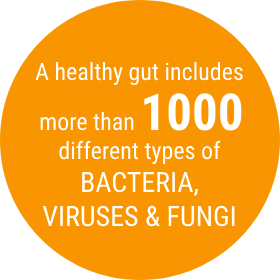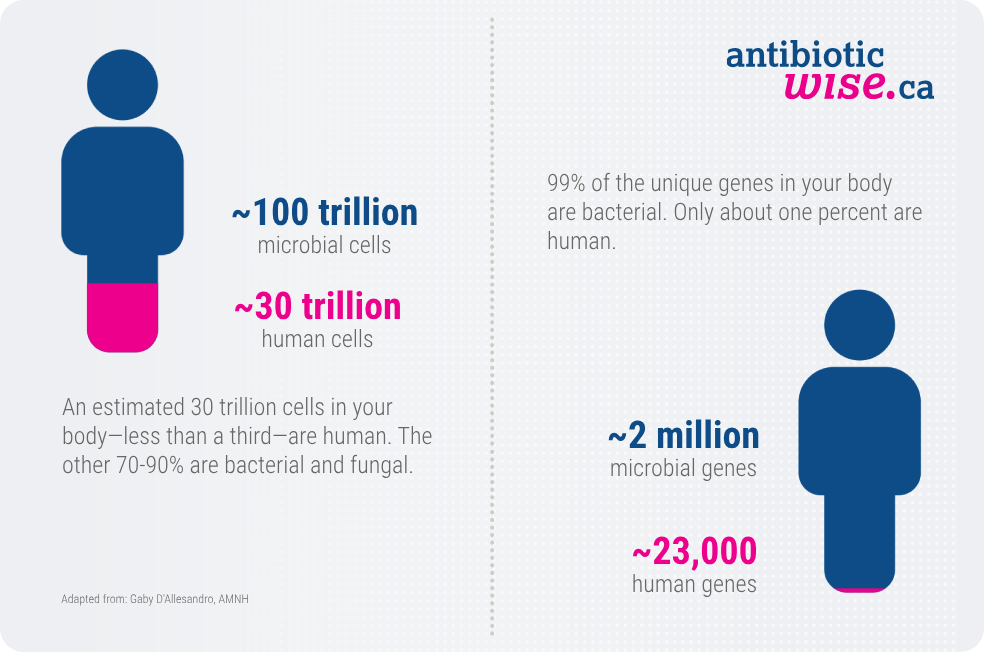Microbiome – How trillions of microorganisms work to keep you healthy

What is the microbiome?
- We have trillions of bacteria living in our bodies. Different groups of bacteria live in different parts of the body (skin, mouth, nose, reproductive system, digestive tract), with the vast majority in the gut. They all work to keep us healthy.
- Most of our bacteria are helpful to us and are sometimes called “good bacteria” or our “microbiome”.
- The word microbiome comes from the Greek micro – meaning small, and bios – meaning life. The term describes the microorganisms, like bacteria, viruses and fungi, that live on and in a person’s body and all around us.1
- Each individual has a their own microbiome, much like a fingerprint.
- Many factors such as diet, environment, having pets and our overall health affect our microbiome.


Our microbiome is priceless to us
- Bacteria have always lived on and in our bodies and are necessary for good health.1
- Bacteria in our gut help us digest our food, train our immune system, and even help our brain develop.
- The good bacteria take up space and crowd out disease-causing harmful bacteria.
- The good bacteria contain far more genes than our human genome and produce important components for our body such as vitamin K (blood health) and serotonin (nerve health).1
- Although we don’t understand exactly how, it seems that changes to our microbiome could result in diseases such as asthma, inflammatory bowel disease and Parkinson’s Disease.1
Our bodies contain more bacterial than human cells and genes

Helpful hints to strengthen your microbiome
- Eat a balanced diet rich in fibre, whole grains, fruits and vegetables.2,3 These provide a food source for the good bacteria in your gut. Dietary fibre is sometimes referred to as a form of “prebiotic” as it assists in the growth of these good bacteria.
- Fermented (probiotic) foods such as cultured milk products (certain yogurts), miso, kimchi and sauerkraut contain beneficial live bacteria that can sometimes have a helpful effect on the microbiome.4,5
- Exercise is thought to have a helpful effect on the microbiome; however, one study found that high intensity endurance training might be harmful to the microbiome.7
- Wash your hands often with plain soap (no need for antibacterial soap) which protects you against illness and from getting harmful bacteria into your body. It’s especially important to wash your hands after you have been to the washroom, before you eat, when you’ve been in public spaces and after coughing or sneezing.
- Stay up to date with immunizations and immunize your children to avoid the need for antibiotics.
- Take antibiotics when you understand you have a bacterial infection that requires antibiotics. Antibiotics do not work against viruses.
- Use safer cleaning products at home such as plain soap and water, vinegar or detergent. Avoid products labelled as antibacterial or containing triclosan as many of these can increase antibiotic-resistant bacteria.8,9
The microbiome can become out of balance
- Antibiotics are designed to kill the bacteria causing an infection, but they also kill many of the good bacteria. Antibiotics cause the most damage to the microbiome compared to any other factor.1 When your microbiome is affected by antibiotics, it takes time for the good bacteria to grow back, and repeated antibiotic exposure permanently harms your microbiome.10
- Sometimes when a lot of good bacteria are killed, potentially harmful bacteria can grow and cause infection, such as bad diarrhea from a bacterium called Clostridioides difficile (C. diff.).11
- Some sources suggest that an animal-based diet (which is composed of red meats, eggs and cheeses, and processed foods such as white sugar and flour) can weaken the microbiome when compared to a plant-based diet, which is rich in grains, legumes, fruits and vegetables.2
The current evidence about probiotics
- Probiotics are supplements that contain live bacteria that have a potential health benefit.
- Current research does not show that probiotic supplements available on the market have an impact on restoring the bacterial diversity of the gut microbiome following antibiotic treatment.12 In contrast, some research suggests that probiotics can even direct the microbiome towards less diversity if taken after the microbiome was harmed by antibiotics.13 The best way to restore the microbiome after taking antibiotics is improved diet, exercise, and exposure to microbes (through pets, nature, etc.).
- Some studies show that specific types of bacteria can help certain diseases. As with any supplement, you should talk to your healthcare provider if you have questions, especially for young children, older adults, and people with weakened immune systems.
- Research related to manipulating or altering the gut microbiome to prevent or treat disease is ongoing and in the future may involve clinically administered pre/probiotics that are specific to the underlying imbalance.14
- Prebiotics are substances that feed the good bacteria in the gut. Fibres from whole grain, fruits and vegetables are excellent prebiotics. However, there are no scientific studies demonstrating a defined benefit for prebiotics yet.
- Commercially sold probiotics are not regulated by Health Canada, so are not as rigourously tested as medicines. Therefore, their quality cannot be guaranteed and the health effects have not been studied for many of them.
Special groups
Infants
- Infants start to develop their gut microbiome in the womb, during birth when they pass through the birth canal and through skin-to-skin exposure with their caregivers. Breastmilk/human milk also plays a key role in developing an infants’ microbiome.15
- In the first few months of life a healthy microbiome is very important in helping to develop a healthy immune system.
- Disruptions to the gut bacteria at this age can have impacts on immune system development and leave children susceptible to allergic diseases (such as asthma) later in childhood.16,17
- Healthcare providers are careful about using antibiotics for infants because their developing microbiome is especially susceptible to disruption.
- Feeding with breastmilk/human milk throughout infancy helps to establish and protect the microbiome, even when antibiotics may be needed.18
Older Adults
- As we age, the number of different microorganisms in our microbiome decreases.19
- This means the microbiome is less able to keep bad bacteria from spreading and can lead to a higher risk of some infections, such as C. difficile infection.
- An ageing microbiome also recovers slower from the effects of antibiotics
- It is important to only take antibiotics when they are prescribed to you by a health care provider. This protects your microbiome and minimizes interactions with other medications.
Further information
Book: The Whole-Body Microbiome: How to Harness Microbes—Inside and Out—for Lifelong Health – Brett Finlay and Jessica M. Finlay (2019)
Book: B. Let Them Eat Dirt – B. Brett Finlay and Marie-Claire Arrieta (2016)
Film: Let Them Eat Dirt: The Hunt for Our Kids’ Missing Microbes (2019)
References
- Gilbert JA, Blaser MJ, Caporaso JG, Jansson JK, Lynch S V., Knight R. Current understanding of the human microbiome. Nat Med. 2018;24(4):392-400. doi:10.1038/nm.4517
- David LA, Maurice CF, Carmody RN, et al. Diet rapidly and reproducibly alters the human gut microbiome. Nature. 2014;505(7484):559-563. doi:10.1038/nature12820
- Wu GD, Chen J, Hoffmann C, et al. Linking Long-Term Dietary Patternswith Gut Microbial Enterotypes. Science (80- ). 2011;334(October):105-109. doi:10.1126/science.1208344.
- Taylor BC, Lejzerowicz F, Poirel M, et al. Consumption of Fermented Foods Is Associated with Systematic Differences in the Gut Microbiome and Metabolome. mSystems. 2020;5(2). doi:10.1128/msystems.00901-19
- Leeuwendaal NK, Stanton C, O’toole PW, Beresford TP. Fermented Foods, Health and the Gut Microbiome. Nutrients. 2022;14(7):1-26. doi:10.3390/nu14071527
- Ortiz-Alvarez L, Xu H, Martinez-Tellez B. Influence of Exercise on the Human Gut Microbiota of Healthy Adults: A Systematic Review. Clin Transl Gastroenterol. 2020;11(2):e00126. doi:10.14309/ctg.0000000000000126
- Bonomini-Gnutzmann R, Plaza-Díaz J, Jorquera-Aguilera C, Rodríguez-Rodríguez A, Rodríguez-Rodríguez F. Effect of Intensity and Duration of Exercise on Gut Microbiota in Humans: A Systematic Review. Int J Environ Res Public Health. 2022;19(15). doi:10.3390/ijerph19159518
- Maillard JY, Pascoe M. Disinfectants and antiseptics: mechanisms of action and resistance. Nat Rev Microbiol. 2024;22(1):4-17. doi:10.1038/s41579-023-00958-3
- Yang QE, Ma X, Li M, et al. Evolution of triclosan resistance modulates bacterial permissiveness to multidrug resistance plasmids and phages. Nat Commun. 2024;15(1). doi:10.1038/s41467-024-48006-9
- Modi SR, Collins JJ, Relman DA. Antibiotics and the gut microbiota. J Clin Invest. 2014;124(10):4212-4218. doi:10.1172/JCI72333
- Brown KA, Khanafer N, Daneman N, Fisman DN. Meta-analysis of antibiotics and the risk of community-associated Clostridium difficile infection. Antimicrob Agents Chemother. 2013;57(5):2326-2332. doi:10.1128/AAC.02176-12
- Éliás AJ, Barna V, Patoni C, et al. Probiotic supplementation during antibiotic treatment is unjustified in maintaining the gut microbiome diversity: a systematic review and meta-analysis. BMC Med. 2023;21(1):1-18. doi:10.1186/s12916-023-02961-0
- Suez J, Zmora N, Zilberman-Schapira G, et al. Post-Antibiotic Gut Mucosal Microbiome Reconstitution Is Impaired by Probiotics and Improved by Autologous FMT. Cell. 2018;174(6):1406-1423.e16. doi:10.1016/j.cell.2018.08.047
- Cunningham M, Azcarate-Peril MA, Barnard A, et al. Shaping the Future of Probiotics and Prebiotics. Trends Microbiol. 2021;29(8):667-685. doi:10.1016/j.tim.2021.01.003
- Fehr K, Moossavi S, Sbihi H, et al. Breastmilk Feeding Practices Are Associated with the Co-Occurrence of Bacteria in Mothers’ Milk and the Infant Gut: the CHILD Cohort Study. Cell Host Microbe. 2020;28(2):285-297.e4. doi:10.1016/j.chom.2020.06.009
- Donald K, Finlay BB. Early-life interactions between the microbiota and immune system: impact on immune system development and atopic disease. Nat Rev Immunol. 2023;23(11):735-748. doi:10.1038/s41577-023-00874-w
- Patrick DM, Sbihi H, Dai DLY, et al. Decreasing antibiotic use, the gut microbiota, and asthma incidence in children: evidence from population-based and prospective cohort studies. Lancet Respir Med. 2020;8(11):1094-1105. doi:10.1016/S2213-2600(20)30052-7
- Dai DLY, Petersen C, Hoskinson C, et al. Breastfeeding enrichment of B. longum subsp. infantis mitigates the effect of antibiotics on the microbiota and childhood asthma risk. Med. 2023;4(2):92-112.e5. doi:10.1016/j.medj.2022.12.002
- Bosco N, Noti M. The aging gut microbiome and its impact on host immunity. Genes Immun. 2021;22(5-6):289-303. doi:10.1038/s41435-021-00126-8



